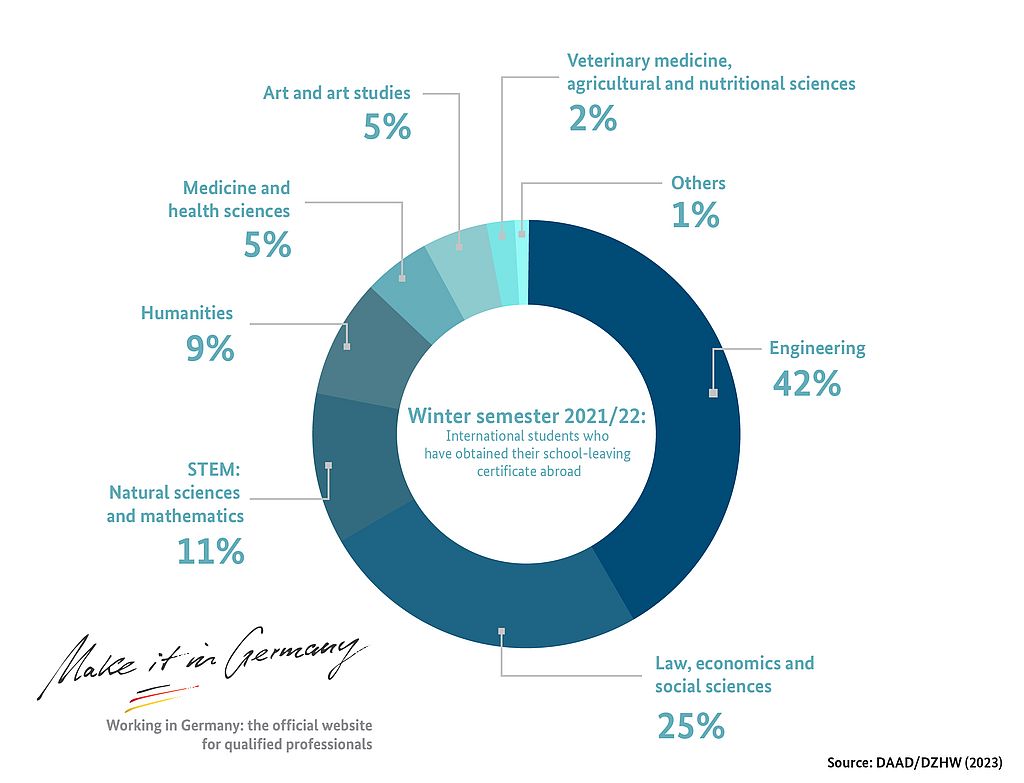International students as the skilled workers of tomorrow
Correct as of: 15/03/2023
Can Germany’s universities act as a gateway for qualified migrants? More than a third of international students from non-EU countries stay in Germany for a longer period. [1] When it comes to filling vacancies, German companies should therefore be open towards this promising target group. This article explains what you need to bear in mind concerning their access to the labour market.
Overview: International students in Germany
Germany is one of the countries most preferred by international students, partly because they have relatively good access to the labour market not only during their studies, but also after graduation. According to the German Academic Exchange Service (DAAD), 349,438 international students who had obtained their school-leaving certificate abroad[2] were enrolled at German universities in the winter semester 2021/22.[3]
With regard to the choice of subjects, engineering is by far the most popular subject group among international students (145,707 students, corresponding to a share of around 42%), followed by law, economics and social sciences (25%), and mathematics and natural sciences (11%). In view of the shortage of skilled workers, German companies may be particularly interested in the fact that the proportion of international students with a degree in a STEM subject is higher than that of their German counterparts, and that international graduates have a higher-than-average qualification level in STEM subjects compared to German graduates (e.g. a Master’s degree or a doctorate).[4]

Potential supply of qualified professionals for German employers
International students in Germany can play an important role in helping companies to fill vacancies. To ensure successful and targeted recruitment, employers should be aware of the advantages of this group. In particular, the following applies to this specific target group:
- Academics hold a qualified German degree, meaning that no statement of comparability or recognition is required for them to be able to be employed as qualified professionals in Germany.
- Graduates usually have a good command of German and, besides having a professional qualification, are already familiar with cultural facets of Germany.
- Many of them wish to stay in Germany long term for professional or private reasons.[5]
- They offer new perspectives, have intercultural skills, and may also have useful international contacts.
- Companies can save valuable time when recruiting foreign skilled workers in Germany (compared to recruiting abroad), because the target group is already in the country. This makes it easier for potential employers to meet their future employees in person; it also means that there is no need for an appointment with the German diplomatic mission.
Universities: a door opener for qualified professional from abroad
It is currently the case that the largest group of migrant academics comes to Germany after having studied abroad.[6] And yet many international students who are already in Germany for the purpose of studying here decide to remain in the country after graduating.
Data from the Federal Statistical Office[7] on students from non-EU countries who were granted a first-time residence permit for studying in Germany between 2006 and 2021 shows the following:
- Almost half 48% of these students still lived in Germany after five years, and more than one-third (38%) after ten years.
- Among the major sending countries of international students, Russia has a particularly high stay rate of 48% (after ten years), followed by China with 29%.
- Around one-third (32%) of the international students who still lived in Germany after ten years held a residence title for the purpose of gainful employment. Moreover, many former international students in Germany opt for naturalisation or stay in the country for family reasons.
In addition, data from the Federal Office for Migration and Refugees for the year 2021 provides insights into the “changes of status” of individuals from third countries who previously held a residence title for studying and switched to a residence title for labour migration (i.e. employment, self-employment, research or job seeking). 36% of former students switched to a residence title for the purpose of seeking employment, while 28% received an “EU Blue Card” for highly qualified persons and another 28% obtained a residence permit for the purpose of taking up qualified employment.[8]
Access to the labour market after graduating in Germany
So how does the transition from higher education to the labour market work? Once they have successfully completed their studies, international graduates have the option of looking for a job in Germany.
Free movement within the EU means that academics from the EU and the European Economic Area (EEA) are granted equal status with German job-seekers. As a result, they do not need a special permit to gain a foothold in the German labour market.
Graduates from third countries have the option of applying for a residence permit for the purpose of seeking employment after leaving university. The Foreigners Authority issues such permits for a maximum period of 18 months.
Note
International graduates with a residence permit for the purpose of seeking employment after graduating in Germany are required to look for longer-term employment as a skilled worker. During the job-seeking period, however, they are permitted to engage in any kind of employment – unlike individuals who enter Germany directly (i.e. not straight after studying in Germany) from third countries with a visa for the purpose of job-seeking.
As soon as an academic receives an offer of a qualified job, they can apply for a residence permit to work as a skilled worker or an EU Blue Card, which will also secure their long-term residence.

Access to the labour market while studying in Germany
During their time at university, international students also have the opportunity to gain insights into the German labour market, establish professional contacts and acquire practical expertise.[9] The following rules apply:
- Students from the EU, the EEA and Switzerland are allowed to work up to 20 hours per week during the lecture period, just like German students. During the semester break, they can work without any restrictions.
- Students from third countries who are living in Germany with a residence permit for the purpose of studying may be employed for 120 full days or 240 half-days per year and pursue part-time student work while at university. This does not require the approval of the Federal Employment Agency.
- International students may also engage in self-employed activities while at university. However, students from third countries require the approval of the competent Foreigners Authority.
Info box: Options for non-completers to switch to another path
Students from third countries who discontinue their studies before completing a degree have the following options:
Apprenticeship: International students have the option of switching to qualified vocational education and training, provided that they apply to the Foreigners Authority for this residence permit in good time.
Full-time employment: If the previously acquired knowledge and skills enable them to do so and they have a concrete offer of a job, international students can also switch to employment before completing their studies. A corresponding residence permit is issued upon application to the competent Foreigners Authority, enabling them to take up employment. The options include a residence permit for employment as a skilled worker, a residence permit for employment with a high degree of practical occupational skills pursuant to Section 19c (2) of the Residence Act (AufenthG) or residence permits to which the applicant is entitled, such as the EU Blue Card.
Long-term prospects for international graduates of German universities
Besides having easier access to the labour market, international graduates of German universities also have good prospects for living in Germany long term.
In addition to obtaining employment in a company, international graduates benefit from further advantages:
- Settlement permit: Graduates of German universities can apply for a settlement permit after as little as two years in qualified employment in Germany.
- Self-employment: Depending on the intended type of self-employment, a residence permit for self-employment can be issued to freelancers and people looking to set up a business. A settlement permit can also be issued following self-employment.
More information on the portal
- Prospects after graduation.
- For more details on the various residence titles for academics, please refer to the “Visa” section at “Make it in Germany”, and use the Quick-Check, for example.
References
[1] Statistisches Bundesamt (DESTATIS) (2022), One third of international students stay in Germany for a longer period (External link) . Press release No. 435 of 12 October 2022.
[2] The DAAD refers to this group (often referred to as Bildungsausländer in other sources) as “international students”. They hold foreign citizenship and have acquired their university entrance qualification abroad or supplemented their school qualification acquired abroad by successfully completing a German Studienkolleg (preparatory course for university admission).
[3] DAAD/DZHW (2023): Wissenschaft weltoffen kompakt 2023. (External link) Facts and Figures on the International Nature of Studies and Research in Germany and Worldwide. Bielefeld.
[4] iwd – Der Informationsdienst des Instituts der deutschen Wirtschaft (2022), Hochschule: Türöffner für ausländische Fachkräfte (External link) .
[5] See DAAD (2022), Accompanying international students in Germany to academic success (External link) .
[6] iwd – Der Informationsdienst des Instituts der deutschen Wirtschaft (2022), Hochschule: Türöffner für ausländische Fachkräfte (External link) .
[7] Statistisches Bundesamt (DESTATIS) (2022), One third of international students stay in Germany for a longer period (External link) . Press release No. 435 of 12 October 2022.
[8] Federal Office for Migration and Refugees (BAMF) (2022), Educational and Labour Migration Monitoring: Issuance of Residence Titles to Third-Country Nationals. Annual Report 2021 (External link) .
[9] Detailed information on career paths of international students can be found on the DAAD portal “Study in Germany”: https://www.study-in-germany.de/en/germany/career/after-university/ (External link) .
Do you have any questions?
Let us advise you on your opportunities to work and live in Germany. Our experts will support you with questions regarding job search, visa, recognition and learning German.
You can find out more about the various contact options by clicking on one of the icons in the bar below.
